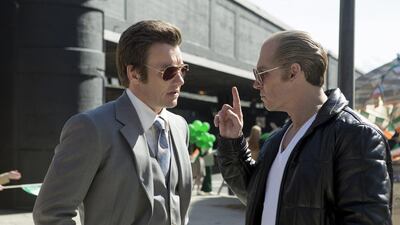Black Mass
Director: Scott Cooper
Starring: Johnny Depp, Joel Edgerton, Dakota Johnson, Benedict Cumberbatch
Three stars
Gangster movies typically follow a recognisable story arc. We meet a young, opportunistic punk, watch as he is taken under an elder mobster’s wing, only to strike out, flourish and eventually fall amid an excess of money, intoxicants and/or ego.
There's no such Greek tragedy in Black Mass. We meet real-life Boston hoodlum Whitey Bulger, crucially, after he's already been locked up in Alcatraz for several years. The movie traces the subsequent ascension of Bulger's criminal career throughout the 1980s and – no spoiler – his eventual fall.
But there's no sense of a journey. The Bulger we encounter has already been chiselled into a hulk, a sociopath without any evident drive, lust or vice, even greed. We're offered precious little psychological exploration of one of the 20th century's most notorious criminal minds. In Black Mass, Whitey remains a brash mystery. From a biographer's perspective, that may simply be fact. But from a filmmaker's viewpoint, it's a lousy premise.
Such a blank canvas, however, offers Johnny Depp an incredible platform in the lead role. Aged and wizened, with receding grey hair and ashen skin, Depp’s portrayal is sinister and intense. He haunts the film with a smouldering sense of danger. But at times it’s hard not to see this as another Depp-dons-make-up caricature.
Director Scott Cooper (Crazy Heart, Out of the Furnace) does some fine work in conjuring the mood and the era. These are Irish mobsters – not the posing, rival "Eye-talians" from the north of the city – and so there is a refreshing aesthetic of grittiness-over-glamour, without a sharp suit in sight.
But the reductive characterisation of the adapted, flashback-led script offers his actors little to work with. Benedict Cumberbatch is excellent as Bulger’s politician brother, Billy. But the fact that he is a senator of Massachusetts – dramatic dynamite, surely – is a clumsily wasted device.
Meanwhile Bulger’s wife, played histrionically by Dakota Johnson, is little more than a walk-on moral compass.
The relationship that counts most in the film is Bulger’s connection with schoolboy-friend-turned-FBI agent John Connolly, to whom Bulger fed information for years. But, played angstily by Joel Edgerton, Connolly’s motivation’s are as covert as his sinister informant’s – it appears he simply got high on the power of associating with gangsters.
It's familiar dramatic fodder – overly cosy mob-FBI buddy stories have played out more explicitly on screen many times, most notably when Depp played on the other side of the law in Donnie Brasco.
That said, his horror-show performance in the lead role does deserve praise. But playing such a monster offers a limited emotional palette, and those who have hailed this film as a “return to form” for Depp seem to have fallen victim to hyperbole and hype.
His Bulger is evil and twisted, but not much else. Without an identifiable sense of humanity, he remains an abhorrent enigma impossible for an audience to empathise with.
What we’re left with is a gripping mood piece without a payoff, a film lacking the dramatic or emotional intrigue we associate with mob movies – and that remain necessary to any film.
rgarratt@thenational.ae

